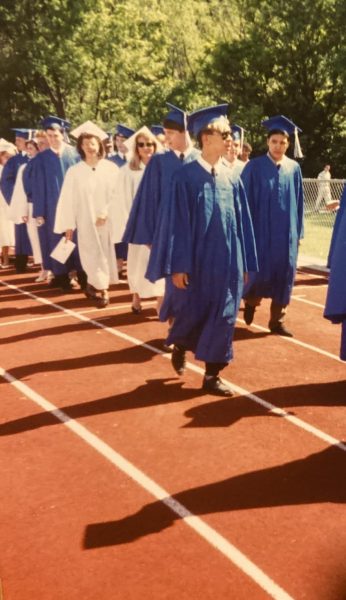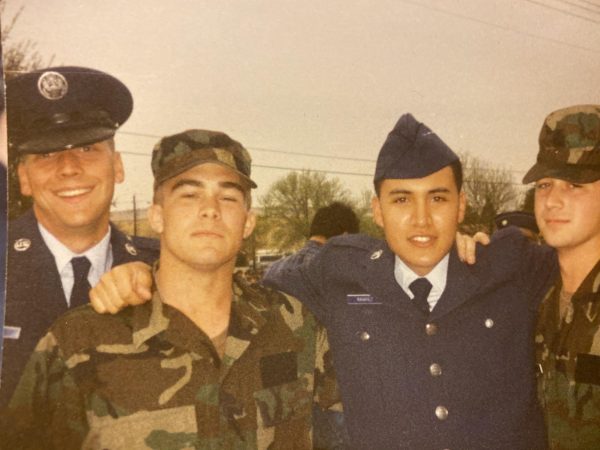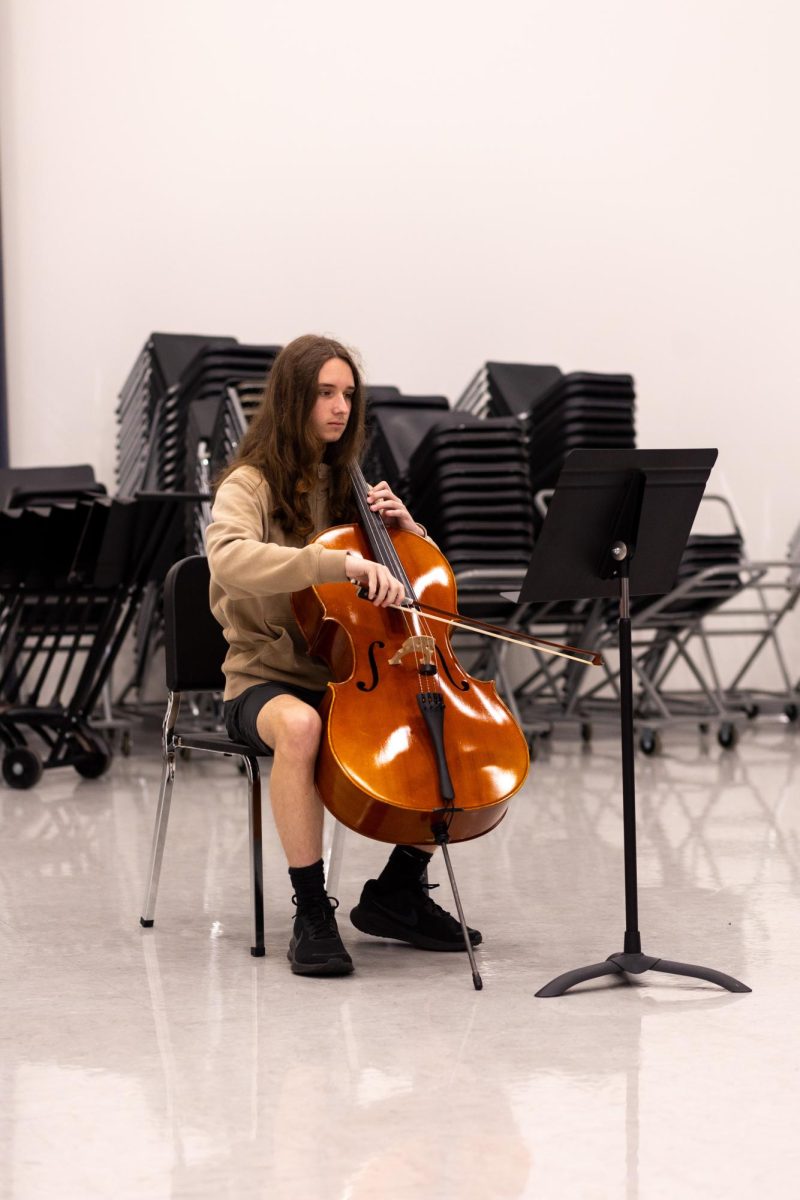An austere, small room sits near the end of the entrance hallway across from the art gallery. Blue and white colors pervade the space. Two chairs stand at attention, waiting to fulfill their purpose. Various items are haphazardly strewn across the desk. Sticky notes coat the desk, a mural of vivid reminders. Perched on a wall near the back of the room is a sign revealing the room’s purpose. The sign, printed in blue and red letters and cleanly decorated with hearts and spirals, states, “Officer Ramirez.” But beneath this message and the students’ appreciation for its recipient lies a deeper story.
School resource officer Rick Ramirez grew up in East Salinas, California, a small city south of San Francisco. His environment led him to take up a life of juvenile delinquency as a teen, participating in illicit activities throughout a large part of his adolescence.
“The family dynamic and the area that I was from, that’s just what you did,” Ramirez said. “I followed my dad [and] uncle’s footsteps. Some of those people got out of being that way, and some stayed in all the way into their adult life.”
Troubled teens often face tough circumstances, which culminates in them acting out at school. After a certain amount of disciplinary action is taken, students are often forced to switch schools.
“I went to several different schools from junior high through high school, and [Ladue] was my last high school,” Ramirez said. “This was my last ditch effort to try and finish school.”
After hopping from school to school, Ramirez finally ended up at Ladue, the last high school that was willing to open its doors to him. Another new town and another new school, in a part of the United States that was unfamiliar to him.

“When I came to Ladue High School, the administration staff and the counselors were very patient and understanding of my situation and worked with me,” Ramirez said. “That was a motivator for me to try and do better, because so many people were putting time into me.”
After graduating from high school and spending time working out what to do with his life, Ramirez joined the Air Force in an attempt to find meaning. During his four years of service, he was stationed in Minot, North Dakota.
“[It] provided more structure for me and [more] responsibility, because my job was very stressful and required me to have a secret security clearance,” Ramirez said. “If you weren’t good at your job, then there could be disciplinary actions. Being given that structure and responsibility at such a young age helped me to develop and move on.”
Between graduating and enrolling in the Air Force, Ramirez went back home to see the people he knew in the past. He found that few people were afforded the same resources that he was, and a lot of his friends were stuck where they had been before he graduated.
“I went back after I graduated, I went back to California, and the people that I grew up with were still doing the same things, they didn’t advance in life at all,” Ramirez said. “It wasn’t their fault, they just knew that was what their life was. For me to be able to come here and see that there was something different, that was [my] motivator. I never stopped making myself better. I’m still trying to make myself better and do bigger things all of the time.”

Following his stint in the military, Ramirez became a police officer for St. Louis City, then the city of Ladue. After spending a decade in the department in various positions, he was assigned to be the school resource officer at Ladue High School. He returned to the same place where he graduated 27 years prior, this time as an officer.
“This was another position that they would give policemen to get experience,” Ramirez said. “I was in the detective bureau before I came down here, and I was just filling in until they did a process to put a school resource officer down here. It was only supposed to be temporary, a couple weeks, but then when I got down here, I realized that this might be a pretty good job.”
Initially, Ramirez was lukewarm on the idea of working in a school. Juvenile law is a complex topic to work with, and school environments provide unique challenges.
“Juvenile law is different from regular law, and I didn’t want to work with juveniles, but that hasn’t always been the case,” Ramirez said. “My motivation to become a police officer was, initially, I wanted to give back to the youth. When I became a policeman and figured out how it is a nightmare to deal with juvenile law, I didn’t want anything to do with it. [but], when I got here, and started speaking in classes or doing training, I enjoyed it.”
Ramirez had finally been given the opportunity to help people in the same situations that he found himself in in his teenage years: helping students stay out of the criminal justice system before leaving high school. Currently, Ramirez works with a variety of departments regarding the security of the school, and the wellbeing of its students.
“He is a really important voice when it comes to our school safety,” social studies teacher Molly Beck said. “He is an expert. I know sometimes it’s easy for us to be like, ‘That’s officer Ramirez, he’s here to hang out with us and be there for us,’–which is true, but he is a trained officer and detective with a lot of experience.”
There are a variety of factors that make individuals turn to juvenile delinquency. Now, as a school resource officer, Ramirez is more involved in understanding what causes troubled behavior in students, and what makes them turn to the same things that he did in the past. He often travels around to classes and speaks to students about their constitutional rights and his police work.
Coming back, year after year, leads to the eventual question of retirement. Ramirez is 52 years old, with his son already graduated from Ladue High School. However, his plans for the district and its students have only begun.
“For a long time, I’ve been trying to get a school resource officer at the middle school,” Ramirez said. “That’s where behavior starts to change. If a school resource officer there can impact the kids earlier, by the time they get here, they will have kind of an idea how to use the school system and get their education. We finally got one down there. Even once I retire from police work, I still have other plans, hopefully in the school system here in Ladue.”
Between working on the street and working in a classroom, one an environment with constant action, and one with less movement, Ramirez has found his place-working in a school, helping students and ensuring their safety.
“When I meet parents, and they go, ‘Officer Ramirez, my son had you five years ago, he still talks about you,’ I know I’ve made some kind of impact,” Ramirez said. “When a parent or a student comes back to visit the school years and years later and says [that] I made a difference, or helped them with their path to where they’re going–that is the most satisfying part of my job. In the last 27 years, I’ve had a lot of positions in the city that didn’t give me the [same] gratification of knowing that I helped someone.”


![School resource officer Rick Ramirez sits in his office. He usually spends little time in his office throughout his day of work, focusing on other issues. “Where our students are, I try to be,” Ramirez said. “Sometimes I get off at 2:45 p.m. when nothing’s going on, or sometimes I get off at 10 p.m. [Those are] my hours.”](https://laduepublications.com/wp-content/uploads/2024/12/Hsiao_20241203_ID_RickRamirez_007-799x1200.jpg)



![Reva poses in front of her home and address plaque. After reuniting with her father and grandparents, she has made many new memories and retained her culture. “We have a lot of Indian cooking going on,” Reva said. “I also like telling people about Indian food, mainly because that’s something that really connects me to [Mumbai].”](https://laduepublications.com/wp-content/uploads/2024/12/At-Home-1200x799.jpg)



